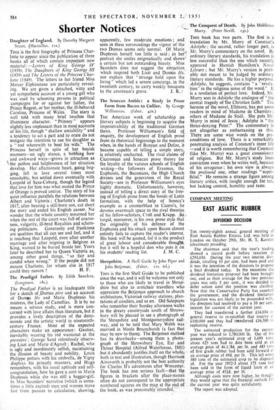The Senecan Amble: a Study in Prose Form from Bacon
to Collier. By George Williamson. (Faber. 425.) THE American work of scholarship on literary subjects is beginning to acquire the impenetrability of the traditional German thesis. Professor Williamson's field of. enquiry, the development of English prose from its rhetorical beginnings to the moment when, in the hands of Bunyan and Defoe, it became capable of telling a simple story, is relatively uncharted. The rival claims of Ciceronian and Senecan prose theory for the loyalty of the various schools of English writing—the followers of Erasmus, the Euphuists, the Baconians, the High Church divines and the generation of the Royal Society—are in Professor Williamson's eyes highly dramatic. Unfortunately, however, instead of telling a direct story of the free- ing of English prose from the bonds of Latin formalism, with the help of Seneca's example as a counterblast to Cicero's, he devotes overmuch space to the rival theories of his fellow-scholars, Cron and Krapp. So, turgid, moreover, is his own prose style that the originality of his defence of the Euphuists and his attack upon Bacon almost entirely fails to capture the reader's interest. His book will be quoted, fof it is the product of great labour and considerable thou^ but it will be a hopeful don who puts it on
his students' reading list. J. M. C.


































 Previous page
Previous page